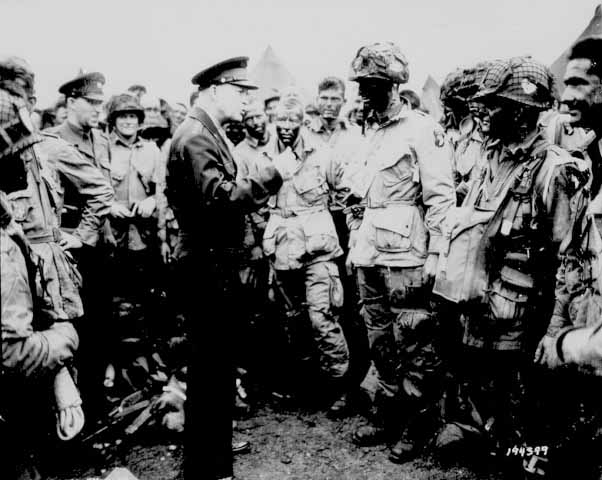
D-Day Minus One: U.S. Paratroopers Leave for France
June 5, 1944
by General Matthew B. Ridgway

Gen. Dwight Eisenhower discusses D-Day landing with paratroopers
of the 101st "Screaming Eagles" Airborne Division on the eve of the invasion.

D-Day Minus One: U.S. Paratroopers Leave for France
June 5, 1944
by General Matthew B. Ridgway

I looked at my watch. It was 10 p.m., 5 June 1944. D-Day minus 1. For men of the 82nd Airborne Division, twelve hours before H-Hour, the battle for Normandy had begun.
We flew in a V or Vs, like a gigantic spearhead without a shaft. England was on double daylight-saving time, and it was still full light, but eastward, over the Channel, the skies were darkening. Two hours later night had fallen, and below us we could see the glints of yellow flame from the German anti-aircraft guns on the Channel Islands. We watched them curiously and without fear, as a high-flying duck may watch a hunter, knowing that we were too high and far away for their fire to reach us. In the plane the men sat quietly, deep in their own thoughts. They joked a little and broke, now and then, into ribald laughter. Nervousness and tension, and the cold that blasted through the open door, had its effect upon us all. Now and then a paratrooper would rise, lumber heavily to the little bathroom in the tail of the plane, find he could not push through the narrow doorway in his bulky gear, and come back, mumbling his profane opinion of the designers of the C-47 airplane. Soon the crew chief passed a bucket around, but this did not entirely solve our problem. A man strapped and buckled into full combat gear finds it extremely difficult to reach certain essential portions of his anatomy, and his efforts are not made easier by the fact that his comrades are watching him, jeering derisively and offering gratuitous advice.
Wing to wing, the big planes snuggled close in their tight formation, we crossed the coast to France. I was sitting straight across the aisle from the doorless exit. Even at fifteen hundred feet I could tell the Channel was rough, for we passed over a small patrol craft - one of the checkpoints for our navigators - and the light it displayed for us was bobbing like a cork in a millrace. No lights showed on the land, but in the pale glow of a rising moon, I could clearly see each farm and field below. And I remember thinking how peaceful the land looked, each house and hedgerow, path and little stream bathed in the silver of the moonlight. And I felt that if it were not for the noise of the engines we could hear the farm dogs baying, and the sound of the barnyard roosters crowing.

 Back to Frank Draper, Jr. Page
Back to Frank Draper, Jr. Page